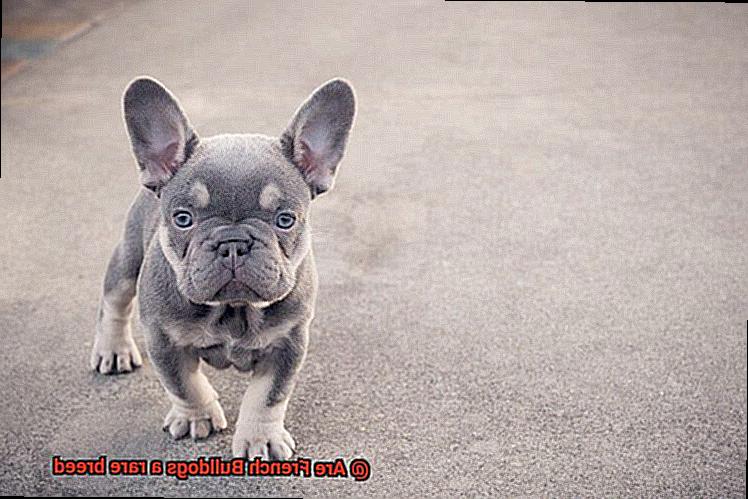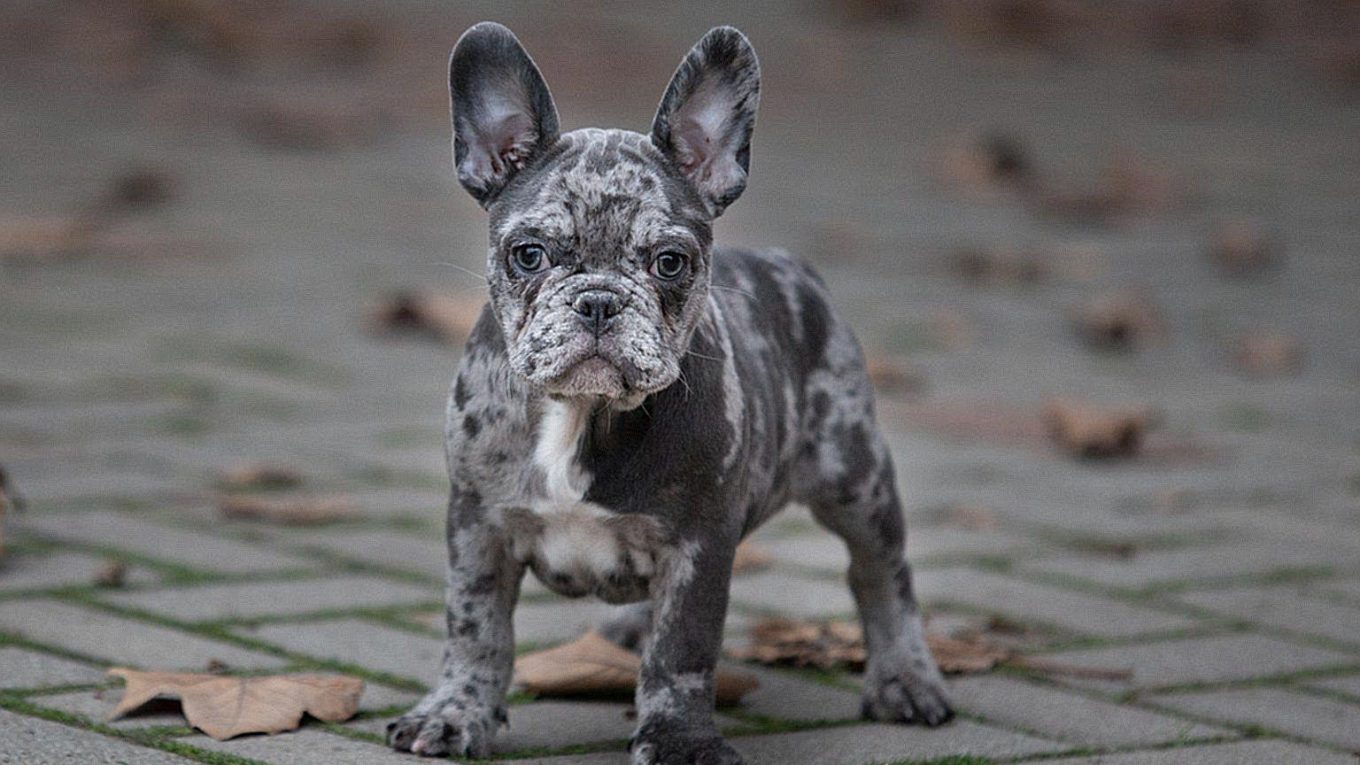Are French Bulldogs a rare breed?
Welcome to the captivating world of French Bulldogs, a breed that effortlessly blends charm, beauty, and an undeniable sense of uniqueness. Have you ever wondered if French Bulldogs truly belong to the exclusive club of rare dog breeds? Well, you’ve come to the right place. In this blog post, we’ll dive into the enchanting realm of French Bulldogs and explore why they’re considered a rarity among dog enthusiasts.
Affectionately known as “Frenchie” by their adoring fans, these compact canines have skyrocketed in popularity, leaving many curious about their scarcity. Whether they’re strutting alongside celebrities on the red carpet or taking over social media feeds, these little charmers boast a distinctive appearance and an irresistible personality that sets them apart from other dogs.

Join us on this intriguing journey as we uncover the truth behind these four-legged enigmas. From their historical origins to their current status as one of the most sought-after companions on the planet, we’ll delve into every aspect of what makes French Bulldogs so captivating.
Get ready to discover why French Bulldogs are stealing hearts worldwide and uncover whether they truly live up to their elusive reputation. So buckle up and embark on this extraordinary adventure as we unravel the mystery surrounding French Bulldogs.
Are French Bulldogs a Rare Breed?
Contents
- 1 Are French Bulldogs a Rare Breed?
- 2 Unique Variations of the French Bulldog Breed
- 3 The Blue Color Variation in French Bulldogs
- 4 The Chocolate Color Variation in French Bulldogs
- 5 Other Rare Patterns and Markings in French Bulldogs
- 6 Health and Temperament Should Always Be Prioritized
- 7 Finding Reputable Breeders for Rare Variations
- 8 Unethical Breeding Practices to Avoid
- 9 Conclusion
In this blog post, we will explore the reasons behind the perception of French Bulldogs as rare, debunking the myth while shedding light on some unique variations within the breed.
Population Size:
Contrary to popular belief, French Bulldogs are not rare in terms of population size. In fact, they are ranked as the fourth most popular breed in the United States. This popularity indicates a significant number of French Bulldogs in existence, although their availability may vary depending on location.
Demand and Availability:
The surge in demand for French Bulldogs has contributed to the perception of rarity. These dogs are highly sought-after due to their suitability for apartment living, friendly temperament, and irresistible charm. However, finding a well-bred French Bulldog can be challenging. Responsible breeders prioritize health, temperament, and adherence to breed standards, leading to limited availability. Reputable breeders may have waiting lists for their litters, further adding to the perception of rarity.
Rare Variations:
While French Bulldogs themselves are not considered rare, there are unique variations within the breed that can be considered rare. These variations include coat colors, patterns, and markings that are not commonly seen. For instance, blue French Bulldogs have a dilute gene that gives them a blue-gray appearance. Chocolate French Bulldogs have a brown coat color that stands out from the traditional fawn or brindle coats. Additionally, variations in patterns and markings like pied or brindle add to the uniqueness of these dogs.
Ethical Considerations:
It is crucial to emphasize that while rare variations in French Bulldogs may be visually appealing, they should not be prioritized over health and temperament. Breeders who solely focus on producing these rare variations may neglect important aspects of breeding. Responsible ownership involves researching reputable breeders who prioritize the overall well-being of their dogs, ensuring they are not supporting unethical breeding practices.
Unique Variations of the French Bulldog Breed
French Bulldogs have captured the hearts of dog lovers worldwide with their charming personalities and adorable looks. But did you know that within this beloved breed lie some truly remarkable variations that make each Frenchie a one-of-a-kind companion?
Join us as we embark on a journey into the enchanting world of French Bulldog variations, where we’ll explore their coat colors, physical features, sizes, and markings.
Coat Colors: A Kaleidoscope of Canine Beauty
French Bulldogs come in a wide range of coat colors, making them a true kaleidoscope of canine beauty. From classic brindle and fawn to more unique shades like cream and blue, there is a color to suit every taste. Imagine walking down the street with a stunning blue-hued Frenchie by your side, turning heads wherever you go. Or perhaps you prefer the elegance of a cream-colored Frenchie that exudes an air of sophistication. The possibilities are endless when it comes to the coat colors of French Bulldogs.
Physical Features: Ears that Steal Hearts
One of the most distinctive physical features of French Bulldogs is their bat-like ears. These erect and wide-set ears give them an unmistakable appearance that steals hearts wherever they go. Picture those adorable ears perked up, ready to listen to your every word with unwavering attention. It’s no wonder French Bulldogs are known for their expressive faces and ability to communicate without uttering a single bark.
Sizes: From Standard to Miniature Marvels
While the standard size for French Bulldogs ranges from 16 to 28 pounds, there are also smaller versions known as “mini” or “teacup” French Bulldogs. These pint-sized marvels capture all the charm and personality of their larger counterparts in a compact package. If you’re looking for a Frenchie that can fit snugly in your lap or accompany you on all your adventures, a mini French Bulldog might be the perfect choice for you.
Markings: Unleashing the Beauty Within
Some French Bulldogs boast unique markings that set them apart from the pack. Picture a Frenchie with eye-catching spots or stripes on their coat, adding an extra layer of beauty to their already irresistible looks. These markings can be found in various patterns such as pied or brindle, creating a mesmerizing effect that showcases the individuality of each Frenchie.
But remember, while these variations add to the allure of French Bulldogs, they do not affect their health or temperament. Regardless of their color, size, or markings, all French Bulldogs share the same loving and affectionate nature that has made them a favorite among dog owners around the world.
The Blue Color Variation in French Bulldogs
Here, we will delve into the genetics behind this mesmerizing coat color and explore the potential health risks associated with it. Whether you’re a proud owner or a curious enthusiast, this guide will provide you with valuable insights to navigate the world of blue Frenchies.
The Genetics of Blue Coat Color:
The blue color variation in French Bulldogs is caused by a dilution gene known as “d.” This gene affects the production of eumelanin, which is responsible for black and chocolate coat colors. When the dilution gene is present, it results in a stunning bluish-gray or steel-blue appearance in the dog’s coat.
The Breed Standard and Disqualification:
According to kennel clubs like the AKC and UKC, the blue color variation is considered a fault in French Bulldogs. This means that dogs with blue coats may be disqualified from certain conformation shows. However, this does not diminish their appeal as loving companions.
Breeding for the Blue Color Variation:
Breeding for blue French Bulldogs requires careful consideration of genetics. Two dogs carrying the dilution gene must be bred together to produce puppies with blue coats. However, it is crucial to ensure that both parents are healthy and free from other genetic health issues common in the breed.
Potential Health Risks:
While blue French Bulldogs are undeniably stunning, they may be more prone to certain health problems compared to their non-blue counterparts. These can include skin allergies, eye issues, and coat problems. It’s important for owners and breeders to be aware of these potential risks and take appropriate measures to mitigate them.
Responsible Breeding Practices:
Responsible breeders prioritize the overall health and well-being of their dogs over specific coat colors. They conduct thorough health screenings and genetic tests to ensure that their breeding dogs are free from hereditary health issues. This helps to minimize the risk of passing on potential health problems to future generations.
The Chocolate Color Variation in French Bulldogs
If you’re a French Bulldog enthusiast, you’re probably familiar with the wide range of coat colors these adorable pups can come in. From the classic fawn and brindle to the striking blue and lilac, French Bulldogs never fail to steal our hearts with their unique hues. Today, we’re going to delve into the world of chocolate French Bulldogs – a delightful color variation that is sure to satisfy your craving for something sweet.
What Causes the Chocolate Color?
The chocolate color in French Bulldogs is the result of a gene mutation known as the B locus. This gene controls the production of eumelanin, the pigment responsible for dark colors in a dog’s coat. In chocolate Frenchies, this gene is mutated, leading to a dilution of the eumelanin pigment and giving them their rich, chocolatey appearance.
Variations in Shade
Just like a box of chocolates, chocolate French Bulldogs can come in different shades and intensities. Some may have a deep, luscious brown color reminiscent of a velvety chocolate truffle, while others may sport a lighter, milk chocolate-like hue. The exact shade can also be influenced by other factors such as the dog’s genes and environmental influences.
The Challenges of Breeding for Chocolate French Bulldogs
Breeding for chocolate French Bulldogs can be quite challenging due to the specific gene mutation required. Responsible breeders must carefully select parent dogs that both carry the chocolate gene and are free from any health issues or genetic abnormalities. The limited availability of French Bulldogs carrying this gene also contributes to their rarity and higher price compared to other coat colors.
Health and Well-being
While the chocolate color may be visually appealing, it’s important to remember that it doesn’t affect a Frenchie’s temperament or overall health. Chocolate French Bulldogs are just as loving, playful, and loyal as their counterparts with different coat colors. However, it’s crucial for both breeders and potential owners to prioritize the health and well-being of these dogs.
Finding a Reputable Breeder
If you’re considering adding a chocolate French Bulldog to your family, it’s essential to find a reputable breeder who prioritizes the health of their dogs. Look for breeders who conduct thorough health screenings and genetic testing to ensure their breeding dogs are free from any hereditary health issues. Additionally, responsible breeders will provide proper socialization and care for their puppies, setting them up for a happy and healthy life.
Considerations for Potential Owners
Before bringing home a chocolate French Bulldog, it’s important to be aware of the potential health risks associated with the breed. French Bulldogs, in general, are prone to certain health problems such as breathing difficulties, allergies, and joint issues. Choosing a reputable breeder who focuses on breeding healthy dogs is crucial to minimize these risks and ensure you have a long-lasting bond with your furry companion.
Other Rare Patterns and Markings in French Bulldogs
Let’s dive into the mesmerizing world of the merle pattern in French Bulldogs. This rare and captivating coat pattern is characterized by a marbled or mottled appearance, with patches of lighter and darker colors scattered across the fur. Picture a beautiful painting created by Mother Nature herself.
The merle pattern is caused by a genetic mutation that affects the distribution of pigment in the dog’s coat. While it is more commonly seen in breeds like the Australian Shepherd, merle French Bulldogs are quite rare and highly sought after by enthusiasts. Their unique coat patterns make them stand out in a crowd, and they are often considered one-of-a-kind treasures.
[Subheading: Blue French Bulldogs – A Delicate Hue]
If you’re looking for a French Bulldog with a truly distinctive color, then the blue pattern might be just what you’re searching for. These adorable pups possess a dilute gene that affects the color of their coat, resulting in a stunning bluish-gray appearance. Imagine a little fluffball resembling a delicate cloud floating through your home.
In recent years, blue French Bulldogs have gained popularity and have become highly desirable among dog lovers. Their unique hue sets them apart from the traditional fawn or brindle coats, making them real head-turners wherever they go.
[Subheading: Cream-Colored Cuties – The Creme De La Creme]
If you’re in search of a French Bulldog that stands out from the crowd with its pale, cream-colored coat, then look no further than those with the creme pattern. These rare beauties possess a unique coloring that sets them apart from the typical fawn or brindle coats seen in most Frenchies.
Cream-colored French Bulldogs are relatively rare and are often considered the “creme de la creme” of the breed. Their elegant and sophisticated appearance makes them truly special and coveted by French Bulldog enthusiasts worldwide.
[Subheading: Marked with Charm – Black Masks and White Markings]
In addition to these rare patterns, some French Bulldogs exhibit unique markings that add an extra touch of charm to their already adorable faces. Black masks are one such marking that can cover the entire face or just parts of it. They give each dog a distinctive appearance and can make them stand out in a crowd.
Furthermore, French Bulldogs with black masks combined with white markings are even more eye-catching. These markings can appear on various parts of the body, such as the chest or paws, creating a beautiful contrast against their coat color.
It’s important to note that while these rare patterns and markings make French Bulldogs unique and eye-catching, they do not affect their temperament or health. Whether your Frenchie has a standard coat color or one of these rare variations, they will still possess the same lovable qualities that make them such popular pets.
Health and Temperament Should Always Be Prioritized
When considering a French Bulldog as a pet, it is essential to prioritize their health and temperament. These two aspects play a significant role in ensuring the well-being and happiness of your furry friend. Let’s explore why health and temperament should be at the top of your list when choosing a French Bulldog as a companion.
Health Concerns:
French Bulldogs are unique in their physical characteristics, but these traits can also make them prone to certain health issues. Understanding and addressing these concerns will help you provide appropriate care for your pet. Some common health issues in French Bulldogs include:
- Brachycephalic Syndrome: This condition, characterized by their shortened skull shape and narrow airways, can lead to breathing difficulties. Avoid exposing your French Bulldog to hot and humid weather or strenuous exercise, as these can exacerbate their respiratory problems.
- Heatstroke: Due to their brachycephalic nature, French Bulldogs have difficulty regulating their body temperature. They are more susceptible to heatstroke, especially in high temperatures. Keep them cool, hydrated, and avoid exposing them to excessive heat or intense physical activities during hot weather.
- Genetic Disorders: French Bulldogs are prone to genetic disorders like hip dysplasia and intervertebral disc disease. Ensuring that your prospective pet comes from reputable breeders who conduct health screenings and genetic testing can minimize the risk of passing on these disorders.
Temperament Considerations:
French Bulldogs are known for their affectionate and friendly nature, making them excellent family pets. However, it is essential to consider their temperament when choosing a companion. Here are some key points to keep in mind:
- Socialization: Proper socialization from a young age is crucial to ensure that your French Bulldog grows up to be well-adjusted and obedient. Expose them to various environments, people, and other animals to help them develop positive behaviors and manners.
- Training: French Bulldogs are intelligent and eager to please, but they can also be stubborn at times. Consistent and positive reinforcement training methods work best with this breed. Remember to be patient and use rewards to motivate your pet during training sessions.
By prioritizing the health and temperament of a French Bulldog, you are setting the foundation for a happy and fulfilling relationship with your pet. Responsible ownership includes regular veterinary check-ups, providing a balanced diet, ensuring exercise, and showering them with love and attention.
Remember that each French Bulldog has its unique personality, so take the time to get to know your furry friend’s individual needs and preferences. With a healthy and well-adjusted French Bulldog by your side, you’ll have a loyal companion for life.
Finding Reputable Breeders for Rare Variations
You’ve decided that a rare variation of French Bulldog is the perfect addition to your family. Congratulations. Now comes the exciting, yet challenging task of finding a reputable breeder who specializes in these unique and sought-after pups. But fear not, I’m here to guide you through the process and help you make an informed decision.
- Do Your Research: Start by conducting thorough research on different breeders in your area or online. Look for breeders who have a solid reputation and positive reviews from previous customers. Check if they are registered with recognized kennel clubs or breed associations, as this indicates their commitment to following ethical breeding practices.
- Health is Wealth: Reputable breeders prioritize the health of their dogs and conduct thorough health testing on their breeding stock. This includes screening for common health issues such as hip dysplasia, eye problems, and respiratory conditions that are prevalent in French Bulldogs. Ask the breeder about the health testing they perform and request to see the results.
- Meet and Greet: It is highly recommended to visit the breeder in person before making any commitments. This will give you the opportunity to see the living conditions of the dogs, meet the breeder face-to-face, and ask any questions you may have. A reputable breeder will be transparent and open about their breeding practices, showing you where the dogs live and providing you with information about their care.
- Observe Behavior: While visiting the breeder, take the time to interact with their breeding dogs and observe their behavior. Well-bred French Bulldogs should have friendly and sociable temperaments, showing no signs of aggression or fearfulness. Pay attention to any signs of poor health or discomfort, such as excessive coughing or difficulty breathing.
- Word of Mouth: Ask the breeder for references from previous customers who have purchased puppies from them. A reputable breeder will be more than happy to provide you with contact information for satisfied customers who can share their experiences with you. Additionally, seek recommendations from local French Bulldog clubs or online communities dedicated to this breed.
- Responsible Breeding: Reputable breeders have a genuine concern for the breed and work towards improving it through responsible breeding practices. They will not engage in unethical practices such as breeding for rare variations solely for profit or breeding dogs with known health issues. Inquire about the breeder’s breeding program and their goals for producing healthy and well-tempered French Bulldogs.
- The Contract: A reputable breeder will provide a written contract that outlines the responsibilities of both the breeder and the buyer. This contract should include health guarantees, information about vaccinations and deworming, and a return policy in case the puppy develops any genetic health issues. Ensure that you thoroughly read and understand the contract before committing to purchasing a puppy.
Unethical Breeding Practices to Avoid
Embarking on the quest to find your perfect rare French Bulldog is like embarking on a thrilling adventure, where you must navigate through a maze of breeders to discover the one who will provide you with a healthy and ethically bred furry companion; so buckle up, do your research, and let me guide you towards making an informed decision that will lead you to the bulldog of your dreams.
Puppy Mills – The Dark Side of Dog Breeding
- Definition and explanation of puppy mills
- Negative impacts on French Bulldogs from puppy mills
- Importance of avoiding breeders associated with puppy mills
Backyard Breeding – A Recipe for Disaster
- Definition and explanation of backyard breeding
- Lack of health testing and veterinary care in backyard breeding
- Risks and consequences for French Bulldogs from backyard breeders
Designer Breeding – Profit Over Health
- Definition and explanation of designer breeding
- Potential health problems in mixed breed dogs
- The importance of prioritizing health over appearance
Appearance Over Health – A Dangerous Trade-off
- Unique physical characteristics of French Bulldogs
- Health problems associated with exaggerated physical traits
- The responsibility of ethical breeders to prioritize health
Illegal Activities – The Dark Underbelly of the Pet Trade
- Smuggling and selling puppies without proper documentation
- Risks to puppy’s health and contribution to illegal pet trade
hx_P054bGuM” >
Conclusion
French Bulldogs are indeed a rare breed.
With their distinctive bat-like ears, compact bodies, and expressive eyes, they stand out in the canine world. Finding a French Bulldog can be quite a challenge due to their limited availability.
Their popularity has surged in recent years, but their numbers remain relatively low compared to other breeds. This scarcity adds to their allure and makes them highly sought after by dog enthusiasts.
Whether it’s their unique appearance or their charming personality, French Bulldogs capture the hearts of many.




